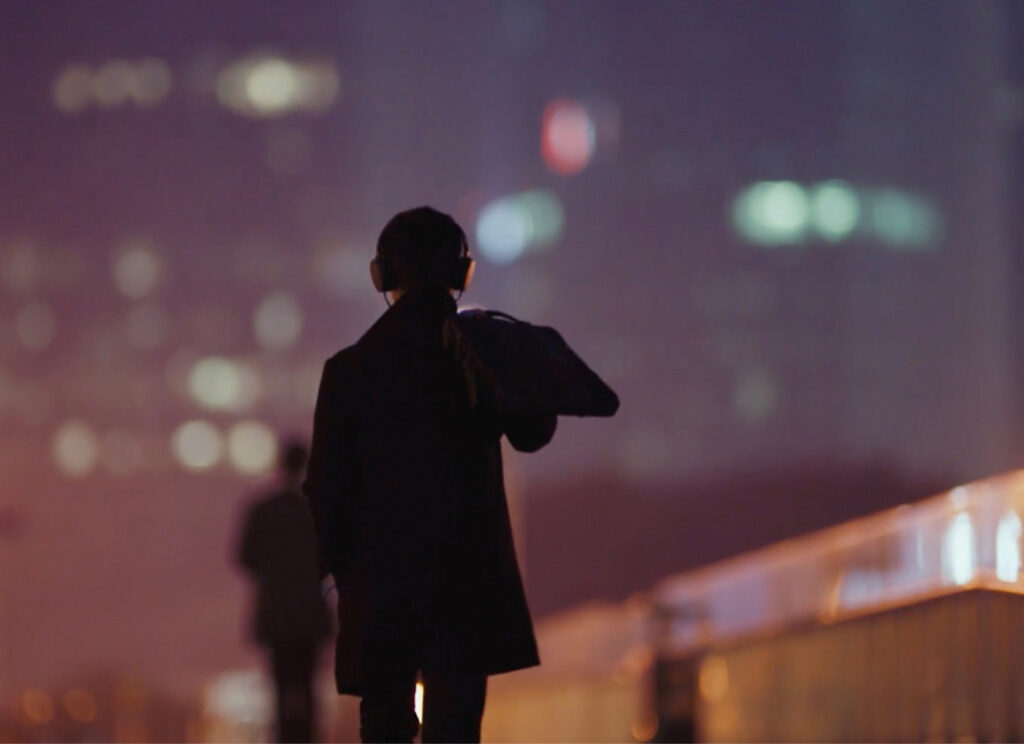“Two/One” is a brilliant indie drama written and directed by Juan Cabral. The film is of two tales about two different men on opposite sides of the world who are inextricably linked. One man, Kaden (played by Boyd Holbrook) is a professional ski jumper who is past his prime and being urged to retire. The other man is Khai (played by Yang Song), a high-up business man excelling in his field.
In their correspondent stories, they both pursue women who aren’t wholly available and neither of them fully respect these women or their boundaries. Khai pursues a woman who isn’t emotionally available due to an abusive past. Meanwhile, Kaden pursues a married woman. The problems they have with women are reflected in the lessons their wise fathers attempt to teach them. They both take prescribed medication for their pain. They are both high achievers in their respective fields who are willing to push themselves beyond their clear limits. They’re different men but also the same man.
From the beginning, we are meant to see each of the men’s stories as parallel to one another. Motifs, sounds, actions, and words shown in one man’s story often show up in the other man’s, suggesting their deep connection. It isn’t until the film’s conclusion that the reason for their connectedness and how it works is revealed. Along the way, themes of loneliness and the point of being with other people is brought up in both men’s narratives.
With this information, here is my theory on some of the meaning in the film (Spoilers Ahead): It is thought that the reason we are all so lonely is because most of us do not have people in our lives that truly understand us. How are we supposed to find them on this huge Earth? We could pass by them on the street, in a shop, or in an airport and have no idea that person would understand everything about us on an intensely intimate level. I think Kaden and Khai are that for one another. Despite their different upbringings, they are, for each other, the person who fully understands them. They go about life similarly and have similar experiences. If they were to sit down and talk, they would love each other deeply and each would finally feel seen by another human. Their uncanny connectedness is shown further after they meet. Their meeting caused their life paths to further intertwine, causing them to suffer the exact same tragic fate.

“Two/One” concludes with a further revelation: we are shown that everyone on the planet is in this kind of relationship with someone else; awake when the other is asleep. Perhaps we all share a soul with another person on the opposite side of the globe.
Jumping into the technical aspects of the film, the cinematography and editing are each a major component of the storytelling. The brilliant editing makes the transitions between the two men clear and engaging. The editor, Emiliano Fardaus, ensures that the noticeable cuts suggest the character parallels to the audience. The editing does not quietly happen in the background. It draws attention to itself, but I think this enhances the film’s experience and gives the film a quicker pace.
The cinematography is beautiful and very polished. The experienced cinematographer, Larry Smith, expertly hides the film’s budget and elevates it, making every shot look much more expensive. Despite the very different landscapes in the film (a snowy Canadian town and the busy cityscapes of Shanghai), the film still has a single look and single tone throughout. All these things come together to expertly tell a story (or two) and the final product is a thought provoking film about us as interconnected people.
*You can watch “Two/One” on Tubi, Google Play, Vudu, Apple TV+, YouTube, and Amazon Prime.



3 Comments
I didn’t consider that theory. Wish you went more into it.👍👍👍
This was an in depth review and it got my full attention! I purposely skipped the spoiler alerts because I was already sold. I’m going to watch this film no doubt about it!
I like the feminist perspective you bring to your reviews. Especialy when looking at films produced largely at the hands of men. I’m curious about how different genders might experience this film. Thank you always bringing attention to films I might have missed!